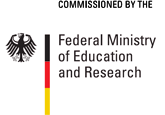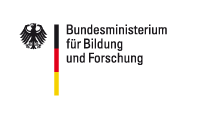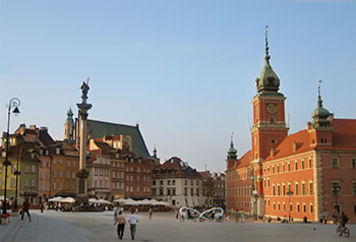- Funding the Cooperation
- Political Framework
- Focus of the German-Polish Cooperation
- Highlights of the Bilateral Cooperation
- Cooperation in the Context of the EU
Funding the Cooperation
A declaration of intent signed in 2016 between the BMBF and its Polish counterpart MNiSW on a jointly coordinated, strategic innovation policy focuses on the funding programme for the digitization of the economy. The key players here are in particular small and medium-sized enterprises (SMEs) and startups. The 2+2 funding programme was coordinated in close consultation with the National Center for Research and Development NCBR. The focus of the first call for proposals in 2018 was 'Digitisation of medical technology / health research.' The 5 selected projects ran between 2019 and 2022. In March 2021, a second call for proposals called 'Digital Green Tech' focusing on 'Smart Villages' was published. 4 projects have been funded since mid-2022.
In view of the eastern enlargement of the EU, the BMBF launched the funding programme 'International Cooperation in Education and Research: Central, Eastern, and South Eastern European Region' ('regional call for proposals') in 2004 with the aim of promoting research projects between German scientists and partners from Central and Eastern Europe. Currently, a similar successor programme is underway under the name 'Integration of the Central Eastern and South Eastern European Region into the European Research Area' (Bridge2ERA2021). The goal is to submit a joint project proposal within the framework of funding programmes of the BMBF or in the framework of Horizon Europe.
Estonian, Latvian and Lithuanian institutions participated together with partners from Poland and the Nordic countries in numerous projects under the funding programme 'Ideas competition to establish and expand innovative R&D networks with partners in the Baltic Sea Region - Circum Mare Balticum' – ('Baltic Sea - call for proposals'), for which the BMBF had published several calls for proposals between 2010 and 2015. The programme was designed to initiate interdisciplinary, innovative R&D networks in the Baltic Sea region with the participation of all Baltic States. The projects funded by the programme concentrate on energy research, environmental research and technologies, ICT, marine research, innovation as well as health research and biotechnology. The objective of the funding programme was to exploit innovation potential through international cooperation and to boost the international competitive advantages of German companies and research institutions in the Baltic region together with their partners.
Political Framework
Poland is Germany's most important partner among the Central and Eastern European countries due to its economic and political ties to Germany. The German-Polish research cooperation is based on the Agreement for Scientific and Technological Cooperation (STC) of 10 November 1989 and has developed dynamically over the last few years. For the BMBF, the current cooperation partner at government level is the Ministry of Science and Higher Education (MNiSW).
Focus of the German-Polish Cooperation
Cooperation in Clinical Neurosciences
Joint calls for proposals in the neurosciences by the BMBF and the Polish Ministry of Science and Higher Education (MNiSW) took place in 2002 and 2006, resulting in more than 20 German-Polish projects. The bilateral activities have been continuing within the framework of the European coordination measures ERA-Net NEURON ERA-NET NEURON II as well as Neuron Cofund and Neuron Cofund2 (until 2025). These activities are intended to lead to a structured European health policy in the field of nervous system diseases.
Research in Germany
The BMBF participated in the POLECO / POL-ECO-SYSTEM trade fair in Poznan from 2005 to 2018 (except 2015). The Ministry presented around 25 selected German research institutions, multipliers and funding organisations at its booth each time. In addistion, a 'German Evening of Research and Development' took place in 2017 and 2018. As a follow-up event for the trade fair participations, a scientific symposium was held in Warsaw in September 2019 on occasion of the 30th anniversary of the Science and Technology Cooperation (STC).
Research for Sustainability
In May 2008, the '1st German-Polish Conference on Research for Sustainability' took place in Warsaw. On this occasion an agreement was signed between BMBF and MNiSW on cooperation in the field of sustainability. In November 2010, the "2nd German - Polish Forum on Eco-Innovation" was held in Poznan as part of the BMBF's participation in the POLECO environmental fair. German-Polish call for proposals were published in 2011 and 2016. 16 bilateral projects were funded. In September 2019, a workshop dedicated to these projects was held in Warsaw as part of the 30th anniversary of the STC.
Highlights of the bilateral cooperation
German-Polish Science Foundation (DPWS)
In June 2008, an intergovernmental agreement on cooperation in the German-Polish Science Foundation was signed. The foundation is jointly funded by the Federal Government, the State of Brandenburg and the Republic of Poland. It supports projects primarily in the humanities, cultural studies, law, social sciences and economics, which are developed and implemented in German-Polish cooperation by students and scientists from both countries. The foundation's capital amounts to around 50 million euros. Poland's endowment currently amounts to 10 million euros. Since the beginning of its activities, the DPWS has supported more than 440 projects with a funding volume of around 12.6 million euros (as of November 2023). Within the framework of a special call for proposals on the topic of 'Stability and Change in Communication in Contemporary German-Polish Relations', the foundation is currently funding two research projects.
German-Polish Research Forum | Science Platforms
In April 2008, the German-Polish Research Forum took place in Leipzig in the presence of the then Ministers Schavan and Kudrycka. Around 250 high-ranking representatives from politics, universities, science and research set the course for closer cooperation between the two countries. The focus was on promoting young scientists and strengthening partnerships and networks. In October 2016, the German-Polish Science Platform 'On the road to innovative Europe' took place in Poznan as a follow-up event to the Research Forum. The approximately 200 participants from politics, enterprises and science discussed best practice examples, (funding) instruments and, among other things, the support of young scientists and incentives and obstacles in the commercialization of research and development results. A German-Polish-Czech Science Platform was held in Dresden in October 2021. The central topics of this high-level event were structural change in the border triangle and the new EU research framework program Horizon Europe.
Cooperation in the context of the EU
In line with the importance attributed to research and technology in the two countries, cooperation under the European Framework Programme has developed dynamically over the last few years. Poland was involved in 1,894 projects within Horizon 2020; 1,254 of these projects ran with German participation. Poland's participation focused on information and communication technologies, energy and transport. For Poland, Germany was the most important cooperation partner in Horizon 2020 after Spain and Italy. Intensive German-Polish cooperation also continues in Horizon Europe (In June 2023, the number of projects with Polish participation was 576, of which 408 with German participation (approx. 70%). The internationalisation and advancing European integration represent opportunities for Germany's science and research landscape and for the private sector.










